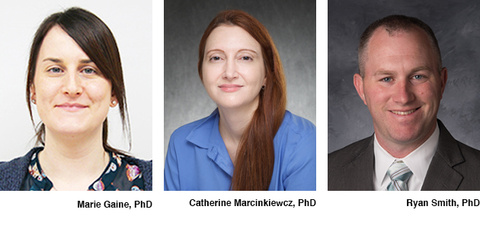Three University of Iowa scientists in the Iowa Neuroscience Institute (INI) have received NARSAD Young Investigator grants from the Brain and Behavior Research Foundation for projects focused on schizophrenia, psychotic disorders, and depression.
- Marie Gaine, PhD, assistant research scientist, working in the Department of Molecular Physiology and Biophysics at the UI Carver College of Medicine, was awarded a two-year, $69,320 grant to study DNA methylation changes in schizophrenia subjects compared to first-degree relatives.
- Catherine Marcinkiewcz, PhD, assistant professor of pharmacology in the UI Carver College of Medicine, received a two-year, $70,000 grant for a project deconstructing connectivity with the Dorsal Raphe in social behavior.
- Ryan Smith, PhD, assistant professor of pharmaceutical sciences and experimental therapeutics in the UI College of Pharmacy, received a two-year, $70,000 grant to investigate the effects of translating genetic risk loci using iPSC-derived neurons.

First awarded in 1987, Young Investigator grants help promising young scientists launch careers in neuroscience and psychiatry. The two-year, $70,000 grants enable investigators to either extend research fellowship training or begin careers as independent research faculty.
UI scientists have a strong track record of success securing NARSAD Young Investigator funding. Since 1987, 29 UI scientists have received this award from the Brain and Behavior Research Foundation. NARSAD is the National Alliance for Research in Schizophrenia and Affective Disorders, now part of the Brain and Behavior Research Foundation.
“These grants are extremely important in supporting the early careers of young neuroscientists across the country and around the world,” says Ted Abel, PhD, director of the INI. “We are very proud of our young scientists’ success. It illustrates the caliber of the next generation of neuroscientists we have working here at the UI. The Iowa Neuroscience Institute seeks to create an environment and a research community where they can continue to thrive and make discoveries that will advance our understanding of neuropsychiatric disease and improve the care of people affected by these conditions.”